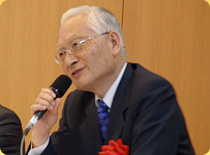 When I was with a telecom company, the motivation of my work was always to pursue how technology could be advanced and how usability could be improved in order for the company’s products to be welcomed not only domestically but also internationally. Now, looking at space development in the same way, I must say that this is not yet a mature industry. When we think of ways to extend the field, I believe that we must take Japan’s position in the world into account. When I was with a telecom company, the motivation of my work was always to pursue how technology could be advanced and how usability could be improved in order for the company’s products to be welcomed not only domestically but also internationally. Now, looking at space development in the same way, I must say that this is not yet a mature industry. When we think of ways to extend the field, I believe that we must take Japan’s position in the world into account.
Japan’s GDP ranks the second in the world. Working for private enterprise, I came to believe that it is important for Japan, proud to be the world’s second most powerful economy, to consider what it can do to contribute globally. I think that the first to cultivate the world of space will be the ones who can afford to do so. Countries that are starving are in no condition to initiate space development. Then who is to take charge? Realistically, it will be the United States, Russia, Europe and Japan. Thanks to the efforts of our predecessors, Japan has earned a position in space development that can be compared to that of a permanent member of the UN Security Council. For example, we are one of the five countries to attend representative conferences for the international space station program. This is the result of Japan’s continuous global contribution, and I think that it ought to be stretched farther. To increase our contribution, I would like to continue to underline the importance of space development to politicians, and to extend myself for bigger budgets on space projects, no matter how small the increase might be.
Japan should contribute to the world through space. So far, achievements in this area have been reflected in communications, broadcasting and weather satellites. Other possible fields for Japan to contribute to will be in disaster management and environmental issues. Private enterprise will not get involved enthusiastically as they do not see much profit there. Thus, naturally, the nation has to take the lead. Of course this will inevitably require public funds, and since we’re using the public’s taxes, so we must think about the best ways to maximize our results.
I do not intend to chase dreams. I would like to focus on how to implement them.
Matogawa: Thank you very much. Your continuous efforts on the matter of budget are always appreciated. Now the last panelist is Prof. Ryojiro Akiba. He has been leading Japan? space technology and engineering for a very long time. After working as the Director General of ISAS and a member of the Space Activities Commission, he is now the President of the Non-Profit Organization, the Hokkaido Aerospace Science and Technology Incubation Center (HASTIC).

 : I am going to talk about my view of the ideal of space development in the 21st century. This photo (* image 6) says, ?oodbye to the 20th century.?First of all, I would like to say that it is time to say farewell to 20th-century space development, which has a very characteristic technological history. General technology --- in other words, the technology that surrounds us --- has developed with the market economy. Examples of this are automobiles and cellular phones. However, space development has always been lead by nations, starting with Germany? V2 rocket, and later as the superpowers competed in space exploration during the Cold War. The aircraft industry was first initiated on a national level as well, but soon public demand grew, and private enterprise got involved in air transportation. In comparison, meanwhile, a half a century has passed without public demand for space development --- it has remained the purview of governments. Many types of technology have benefited from the desire to enhance national prestige and expand national influence, but none more so than space science. : I am going to talk about my view of the ideal of space development in the 21st century. This photo (* image 6) says, ?oodbye to the 20th century.?First of all, I would like to say that it is time to say farewell to 20th-century space development, which has a very characteristic technological history. General technology --- in other words, the technology that surrounds us --- has developed with the market economy. Examples of this are automobiles and cellular phones. However, space development has always been lead by nations, starting with Germany? V2 rocket, and later as the superpowers competed in space exploration during the Cold War. The aircraft industry was first initiated on a national level as well, but soon public demand grew, and private enterprise got involved in air transportation. In comparison, meanwhile, a half a century has passed without public demand for space development --- it has remained the purview of governments. Many types of technology have benefited from the desire to enhance national prestige and expand national influence, but none more so than space science.
 image 6 image 6
|
The public? understanding of space before the 20th century was, as we say in Japanese, like the frog in the well who knows nothing of the ocean (a big fish in a little barrel). People thought that the universe was simply as it appeared from the ground; they didn? realize that what they were seeing was just light, which is only a narrow frequency band among all wavelengths. When we obtained the means to go to space, we were finally able to observe the universe with the full spectrum of wavelengths, which did not happen until the late 20th century. This was a remarkable accomplishment, and is the defining achievement of space development in the 20th century.
Now, coming back to the 21st century, what is the goal of the century? Space development was previously discussed in terms of ?pirit?and culture, so I would like to address this from the point of view of civilization. In my opinion, all technologies will be obliged to help the world build a sustainable civilized society.
My concern lies with the issue of population. Today the world? population is growing by three persons per second. This is not just new birth, but a net increase, and it means that Earth? population is expanding by 80 million people every year. Despite the fact that tens of thousands of people have lost their lives in serious disasters, which is a source of great grief, the overall population of the globe keeps growing. AIDS has had some impact, but it is still considered little. So what I would like to emphasize here is that it is going to be very difficult to sustain the civilizations on our planet as long as ideas and the implementation of building an ideal society for everyone are discussed only within certain groups of people. This is a global-level issue, and we all have to do our part.
In other worlds, space development is no longer someone else? business, and we have come to an era when everyone will get involved. In the last century, the public might have simply been an audience to the efforts of the nation, but in this century, we are all going to take part, which naturally makes things more complex.
Large organizations such as JAXA play an important role. However, when it comes to innovation ?the establishment of new technologies --- size becomes an obstacle, since these organizations have to go through severe evaluations in order to spend money. New ideas and technologies are often created by small groups or organizations, and tend initially to be dismissed as heresy. They can easily be crushed if put through the kind of rigid system of evaluation that? necessary for large public agencies. This is why, I think, a large system has difficulty producing new technologies.
Small organizations with smaller budgets but great flexibility are popping up across the country, and contribute to the building of an ideal society. I think they will be a factor in improving our prospects for the future. As well as Hokkaido, where I work, I think Kanazawa is a very prosperous region in that sense. I would like to suggest that each region be encouraged to have one or two small organizations that are involved in space development for the 21st century.
Matogawa: Thank you very much. That's a very important suggestion. Now, we would like to have some time for questions from the audience. |

